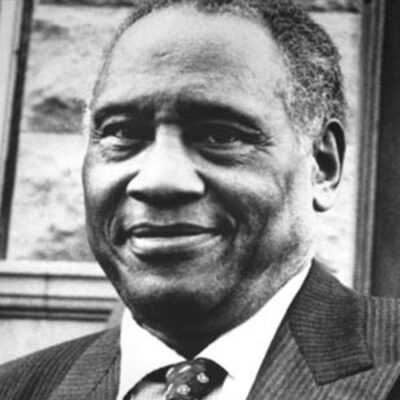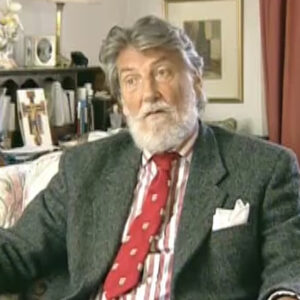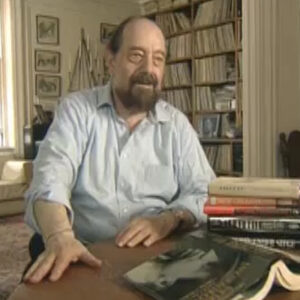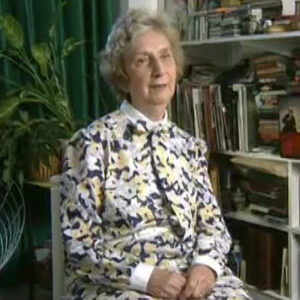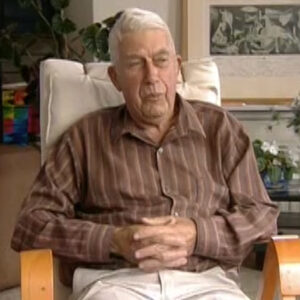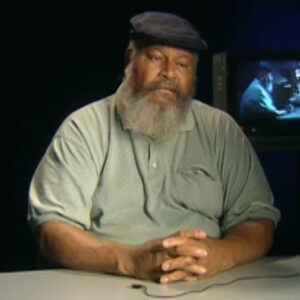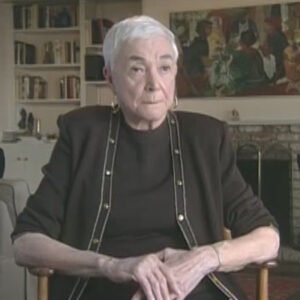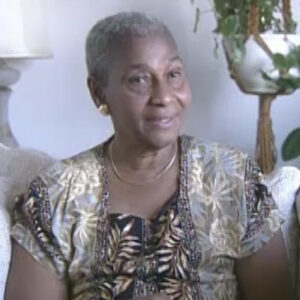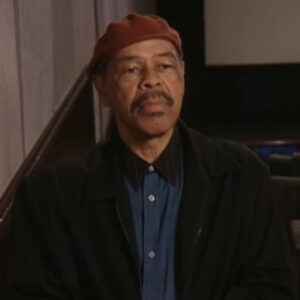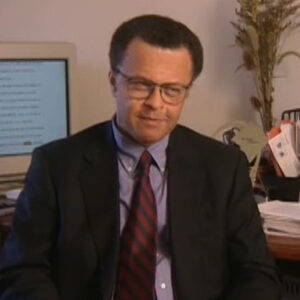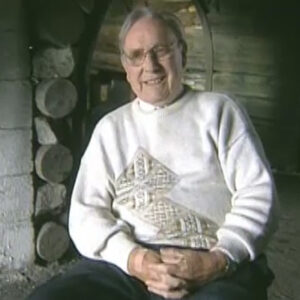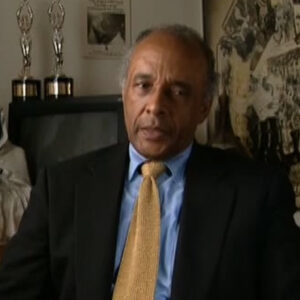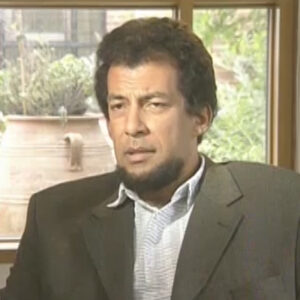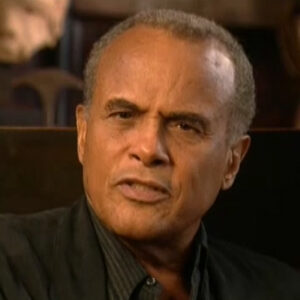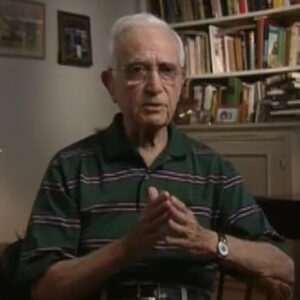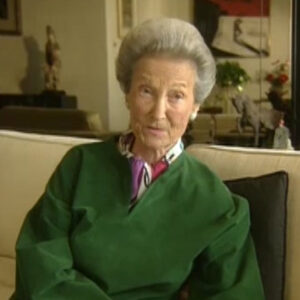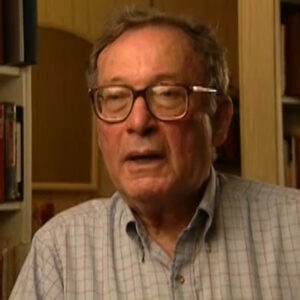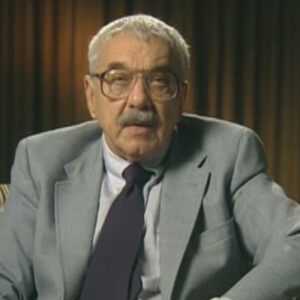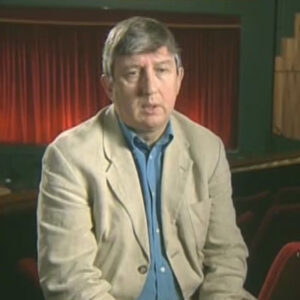Speaker Well, I’ll tell the story, are you sure? Oh, I didn’t raise you well, in 1950, they took away Paul’s passport. The United States government did because he was a socialist and they didn’t like it. And my dad, who was a member of parliament and I were on the committee to get it restored. And in 1958, when it was restored, my dad and I asked him to stay at the house of Parliament and he came. This tall figure, and it was extraordinary to meet him, I mean, I’d long admired his work as an artist, I had him said again, I had long admired him. And when his passport was taken away, I stood in a big hall in London when he sang over the telephone. And I remember going to the Canadian border and singing over the border. But when he arrived, there was this huge figure and it was like an electromagnet going through a pile of iron filings. People just detach themselves. And it wasn’t the usual superstar stuff. They were just drawn to his personality.
Speaker And I had a very old aunt who was about 85 and we had tea in the tea room there, and he sang for her old man river so you could hardly hear it in the whole room, went silent. And he he just inspired a generation of people and suffered for his beliefs.
Speaker We hear about that a little bit closer for just one minute. Yeah, a little bit of.
Speaker This isn’t what he was here for. I mean, how did you know him before you met him?
Speaker Well, I saw his film, Tri-Valley. When was that? In the 1940s. And I’ve got all the cassettes of his music. And I used to listen to them and I loved his music. And then, of course, being a socialist, his socialist convictions came across and deepened and widened my understanding of him. And when he came in, he had a huge impact on the peace movement because he was seen not only as a great socialist, but as somebody campaigning against the Cold War and against the fellow who supported the anticolonial movement. And I knew all the anticolonial leaders, Nehru, I met Gandhi, I met Gary Cohn and so on. The so he became a part a very important part of a whole post-war movement for human rights, for democracy, for peace, for internationalism, for socialism. And it’s in that sense that I remember him as well as as a great singer, an artist, though I can’t think of anyone whose songs I prefer even today that he, uh, that he.
Speaker When he was introduced to the socialist scene here, how developed the political sense was that he learned from them. What did they learn from him?
Speaker Well, I think it it was it was a relationship of mutual discovery, really. He went to Wales before the war and formed an attachment with the Welsh miners, which continued to the Rand Paul junior is there or has been there in the summer of 1998 meeting them. And the Welshman has always been very radical, a bit of strong Marxist element among the South Wales miners, communist leadership, their brilliant leadership. And so that gave him an introduction into that particular world. Then, of course, singing and appearing in London, he got to know all the upper crust people, the top people, and he described how he saw in them their contempt for the people whom he dearly loved. So he got both sides. And then he said, well, I think it was only when he was in Britain he discovered he was in Africa. Now, that’s tremendously exciting because in America they be slavery in the background. And then to come here and discover that he was an internationalist and then to discover that he wasn’t just the blacks who were discriminated against by the working class, not just in America, but everywhere. And then he went to the Soviet Union and he saw with all its defects, the Soviet Union was an experiment in socialism, which transformed the prospects all over the world for oppressed people who hadn’t been for the Soviet Union. And I think the anticolonial movements might never have succeeded because they were terrified. The old empires were terrified. If they didn’t concede independence, they’d go communist and then they’d be a bigger communist world. And even the welfare state, you know, was a product of the existence of the Soviet Union because capital in Britain and and maybe in America, too, felt they had to concede something to the working class to stave off revolution. So he saw that and was victimized. I remember there was a thing called the Congress of Cultural Freedom, which sounded so marvelous about mainly concerned with human rights in the Soviet Union. And I wrote to them and I said, what are you doing about Paul Robeson? But of course, they were financed by the Central Intelligence Agency. And I got one of the nastiest letters I’ve ever got back in my life because these were these anti-communist front organizations. And and Paul, he broke through it already. And his evidence, I think, to the un-American Activities Committee, which I have a copy, was just so moving in here. I stand so uncompromising. That was the thing about he you never apologize for his beliefs. He held them, stuck to them, argued for them, and as a result made a big impact on everyone I’ve ever heard who met him or knew anything about him.
Speaker One of the things I said by not critics, but people who claim to take a step back and take a long look, is that that he was used?
Speaker That that Paul Wilson was sort of not a puppet, but a mouthpiece for progressive.
Speaker Forces, in fact, that he didn’t really know as much as he said he knew that they pushed him out there. How do you feel about him?
Speaker Well, I think people socialist’s recognising in him a great socialist, were proud to associate themselves with it. But he was a brilliant scholar. I mean, he wasn’t just anybody’s tool or instrument. He was a scholar as a sports academic artist. He knew the score and he knew the score at every level. I mean, the fact that he moved among the wealthy, the cause of his work as an international artist meant he got both sides of the picture. And and that, I think, was what gave depth and strength. But, of course, the Soviet Union was delighted that he was interested in their work. And at the time when they were trying to present the Soviet Union as a military threat to the West, which it never was, the idea that the Red Army was going to come to London and make us all read Lenin is absolute nonsense. Well, they were afraid of was the ideas of socialism spreading? And and and because he moved across that Cold War frontier so easily and confidently was able to bring back an interpretation of what was happening in the Soviet Union, which is different from what the mass media, the intelligence services capital multinational bankers were saying about it. And that was his importance really in some respects.
Speaker Well, I can’t tell you how the campaign began. I was when it was set up, I was on the committee, but then I was on all the committees really working in the anticolonial movement, the peace movement and so on, the anti-nuclear movement. So it was just one of the causes that we supported. But the thing about Paul was really that his first link with the British working class movement was with the Welsh miners. It didn’t begin in the shadows of intellectuals. It began there and it was through his contact with the Welsh miners that he realised he was working class as well as black. And all of a sudden that transformed what might otherwise have been a sort of racial preoccupation with a class occupation. And that was what made him a socialist. I think that’s the important thing about him. And then when he saw the upper class and realised how they what contempt they had for the way that deepened it, and he connected that with the way in which blacks were treated in the United States. And and, of course, he did live through a period when repression in the United States was very, very, very strong. And it hasn’t really changed. But he I mean, he was living before Martin Luther King began his great campaign, before the civil rights movement really got underway. So at the time, to argue for colonial freedom was in the view of the of the Pentagon or the State Department, was it self-defense? They argue that he was hostile to the interests of the imperial powers. Now, that is an astonishing thing to remember.
Speaker That was my question. How was he received when he made the transition from entertainer, from the rich to, you know, to the next stage of political awareness? What did the people in power think? I mean, how did they actually become dangerous?
Speaker I don’t think he made a transition from entertainer to socialist. I think if you look at his his book here I stand, you realise that he was awareness of prejudice when he was young that pertained to him.
Speaker There wasn’t strangely bitterness in him, but there was strength of feeling. And that would it was something that shaped his political thinking. I think, strangely enough, Robeson, the singer, came second. It was a talent he had. But his political commitment and my understanding of the man was it began at the very beginning. His father was a slave, for God’s sake.
Speaker Yeah. But a lot of people who say they don’t they don’t they don’t go to socialism as the as the answer. I mean, you know, just as he discovered he was African here, you know, a lot of his class consciousness came here. So.
Speaker Yeah, but his his color consciousness, which came from the United States and after all, it was his consciousness of the oppression of his people, as he called them in the United States, that made him look at the structure of society. People approach socialism by different doorways. If you’re a woman, you may realize there’s discrimination against women and then you realize society is structured to leave men in charge. Women make up 90 percent of the world’s wealth and only 10 percent of the world’s wealth. You can approach it that way. You could approach it in all sorts of ways as a trade unionist, as a black, as a colonial slave. And he approached it from his own experience. I think the reason that Paul Robeson couldn’t be shaken was that it wasn’t an intellectual transformation. It was using his own experience to understand what had happened to him and his people and then say, what can we do about it? Whereas work being done. And that really gave him an authenticity that you wouldn’t have got from reading Karl Marx when you were a kid and deciding you were a communist. Wouldn’t or. It wasn’t that at all.
Speaker Why do you think he didn’t?
Speaker Up in the 50s admit to two things about Russia that other countries are saying, which are the flaws of Stalinism, stuff like that, he just refused to.
Speaker Well, I can understand that, you know, strangely enough, because if you look back at the history of it, in 1917 when the Russian Revolution occurred, there was tremendous support across the whole world, has recently been reburied.
Speaker The old dead tsar and my brother is a Soviet scholar, looked at what Woodrow Wilson said when the tsar died.
Speaker He welcomed the when the czar abdicated. You welcome the application. The czar was a rotten king. And it’s hard, particularly even for people of my generation, that I was born in 25 to to recall exactly the excitement that the Russian Revolution created all over the world. And then the first thing it happened was the West sent an army in to destroy it. The Americans sent an army into Russia. You never read that in an American schoolbook. They sent an army to the British and the French to destroy the revolution. And then in the nineteen twenties and thirties, Hitler was supported by Western governments. There was no appeasement of Hitler. Neville Chamberlain supported it, sent his foreign minister to see Hitler, and the first thing he said was how? Chancellor, on behalf of the British government, I congratulate you on destroying communism in in Germany and acting as a bulwark against Russia. From the very beginning, the Soviet Union was under threat. And when Russia was a when he attacked Russia in 1941, what did Harry Truman say? He said if the Russians seem to be winning, we should support the Germans. If the Germans seem to be winning, we should support the Russians and hope that as many as possible kill each other. That was Truman who set up NATO. And I mean, when you look back on this, you see you get a different perspective on all this huge propaganda against the Soviet Union was motivated not because anyone cared about civil liberties in the Soviet Union. They don’t care. Today, a mafia run Russia. Nobody cares. What it was about was the threat of Soviet socialist ideas. And so you had to sort it all out.
Speaker But I was never a Stalinist. I’m obviously not. I’m a Democrat. And I think that that was one of the great tragedies. But at the same time, the Cold War began before the Second World War ended at Hiroshima. You know, when they dropped the bomb wasn’t to bring Japan to its knees because Japan had offered to surrender, was to demonstrate to the Soviet Union that the United States had a weapon of overwhelming power. So you could look at history a bit differently. And obviously, the Stalinist Stalinist experiment was was a failure because it wasn’t in French deep in the hearts and minds of people through democratic representation. But by God, what about imperialism? That wasn’t right when I was born. Britain controlled twenty percent of the world, no democracy in India when I was born or we didn’t believe in it. So, you see, I think you just have to set that in a proper historical perspective. And Paul, I guess, understood that.
Speaker I’m sorry, I mean, you only want to a sound bite, and I’m talking I’m talking about it is a very interesting subject that the whole question of why he did it.
Speaker Yeah, that’s what I was curious. I mean, because he could have taken he could have gotten some weight off of him by just sort of saying, not really, because they called me a communist.
Speaker They call everybody a communist. I mean, if you believed in colonial liberation or communist, I mean, McCarthyism wasn’t really interested in communism as such. He was answering any critique of capitalism. And one of the things at the end of the Cold War that has liberated socialism now is that they can’t any longer say to criticize market forces. Oh, you’re working for the Kremlin because the Kremlin is now Thatcherite. And when McDonald’s opened its first hamburger joint in Moscow, Mrs. Thatcher said that proved democracy was coming in Russia. But I never equated McDonald’s and burger joints with democracy. But she did because what the collapse of communism was not about democracy in Russia. It was about colonizing the Russian people with highly qualified, low paid workforce and raw materials for Western capitalism.
Speaker Is the colonization of Russia nothing to do with human rights at all? So in that sense, you might argue, well, why did the West now raised more the question of the fact the miners in Russia haven’t been paid for six months? I mean, is that what it was all about, was it to get a situation where they didn’t pay miners, expect them to dig it up, but that’s capitalism. And I think, you know, capitalism is now coming under quite critical examination. And if Paul were alive, he’d be developing that argument.
Speaker Let me ask you this, uh, in terms of your own political development, what did, Paul. To you?
Speaker Well, I love the guy. I must say that first I was just moved by him. I love his music, plays cassettes quite regularly at home, and I’m working late at night. He and his connection with the miners is very important to me because I represented a mining constituency until they closed all the pits. I’m an honorary member of the National Union of Mineworkers and my number is one that’s better than Chevron. And I’m very close. I was energy minister. I’ve worked with the miners. I am a socialist by experience and I’m an internationalist and believe in peace. And I’ve always supported the anticolonial movement, the human rights movement. And Paul spoke for that. And so in every sense, he touched me and I will never forget him. And I I heard at the end of his life he got very depressed. I said worries me that someone who gave so much confidence and hope to people at the end of his life would have been so sad. I don’t know the reason. I don’t know the background, but I believe he did go through a period of depression. Maybe great artists who are no longer in the in the forefront suffer something for it. But he is a great man, really great man.
Speaker OK, now the same question, but what do you think his impact has been on progressive politics? And what do you think he brought to that, that not only when he was active, but in the long range?
Speaker Well, it’s difficult to know what the long range impact of anybody is, but the people who leave footprints in the sands of time and not the great executives, not presidents, prime ministers, chancellors, generals, they have that moment of power. Then they’re forgotten. The people who leave a memory are the people who teach and inspire and give hope. There’s a lovely quotation from an old Chinese philosopher called Lao Tzu on leadership, which I was think of in connection with Paul Lao Tzu. She was born before the birth of Christ, he said. As to the best leaders, the people do not notice they’re just the next best people on it and praise and express the people, make the next batch of people fear. But when the best leaders work is done and the people say we did it ourselves. Now Paul was an inspirer. If you heard Paul knew Paul understood him, he gave you confidence to go on not to be deflected because of all that he suffered for his faith. You realize that whatever is thrown at you, it isn’t anything like what he suffered or his people suffered. No, I think that’s the long term impact.
Speaker Could you know anything I just want. Yeah, you had said a wonderful thing about the tribal solidarity.
Speaker Oh yeah, yeah, yeah, yeah, yeah, yeah, yeah, yeah, yeah. Well okay, fine.
Speaker Yeah, yeah. Spritzed. Yes. Okay, fine. Right. Well the thing about the mining industry is it’s very dangerous and miners working underground have to rely 100 percent on the guy next to them to protect them. If there’s a roof fall, if there’s an explosion, if there’s gas. And so it builds a tribal solidarity, which politically expresses itself very powerful. The miners internationally, I mean, miners internationally are very close anyway. They’re closer than bankers internationally. And it may be people of that nature. Fishermen may be a to say, I don’t know so much about farmers in the sense that they don’t have the same dangers of fishermen. But miners, you need to show and you contrast it with all the slick guys in Wall Street, in the city of London and Frankfurt, who make their living by outsmarting their neighbor miners, make their living and depend for their lives on the absolute loyalty they have to each other in moments of danger. And that quality poor, understood, picked up, reflected and articulated not only in argument, but in music. What a remarkable man.
Speaker Yeah. What’s his his hook up with that? That area really fascinated me.
Speaker There is a movie you’ve probably heard of a film called The Full Monty, which is quite funny, but there’s a much more political movie which Power of Love, quote, brushoff. I really prefer it if you get a chance of watching it. I’ve seen it four times and burst into tears every time. It’s the most movies. You seen it? No, I did have it. Wonderful. It’s more political than the Full Monty. The Full Monty. Funny and and tragic. But but Brush-Off is a bloody marvellous movie.
Speaker The Everything.
Speaker Yeah. It’s just I missed it when I was in the kitchen with her. To illustrate the generosity of spirit, she wanted a story about unity in the houses of Parliament. We actually see what you did. Yeah, he sang. Yeah, yeah, yeah.
Speaker OK, well thank you for the time.
Speaker Now it’s nice too. I mean, you know, it’s a pleasure to talk about it and I’m so glad he’s being recognised. The United States. I’ve done millions of things. Yeah, I will lecture on it in the broadcast.
Speaker It’s pretty clear that his experience in this country really shaped the life. I think it did.
Speaker Well, the interesting thing from the past and almost look into why was there no blacklist to whether it was in our country or near?
Speaker Well, that was. Oh, boy. Yeah. I mean, oh, yes. You say, well, no talk about McCarthyism in the United States. But, you know, there was a quite a lot of discrimination here. I mean, people were expelled from the Labor Party. My predecessor, Stafford Cripps, who was chancellor of the Exchequer, I succeeded him as a member of parliament in 1950. He had been expelled in the 1930s for forming a popular front against fascism. Expelled from the Labour Party, Michael Ford, who later became leader of the Labour Party, was expelled and and Bevan was expelled from the parliamentary labour demand version of the health service. He was expelled from the Labour Party when I was a member, about 55 or 56 for some criticism of the leadership.
Speaker And you mustn’t think that he didn’t accept it wasn’t as bad as the as the McCarthy period and red channels, I think, in California and so on. All that wasn’t as bad as it. Yeah. Is it was there. But anyone who was a socialist was easily denounced as an agent of the Kremlin, a KGB spy and so on. Oh, no. It was an awful period to go through it.
Speaker In a sense, the lesson you have to learn from that is not to let it happen again next time around, because now Islam is a great enemy.
Speaker And if you allow Islam to be the enemy, then you have another Cold War against religion and the Christian right. And so, mind you, my own opinion, for what it’s worth is the most dangerous religion in the world is monetarism. Monetarism allows you to close factories without firing a shot. You just told them they’re unprofitable. So they all go away. And the paramilitaries of monetarism are the mafia. Why bother to make a profit if you’ve got a Thompson submachine gun and monetarism infects every nation in the world is bringing the economy into recession and slump. So monetarist fundamentalism is a religion and a very, very dangerous religion and the absolute opposite of internationalism.
Speaker Socialism, the ropes and believed in me as a question went when they had that the the the passport retrieval campaign.
Speaker Did that hook into already established political structures?
Speaker Well, it was a left campaign and left campaigns have been associated to some extent with the Labor Party. But the Labor Party is not a Socialist Party. They’re a socialist in the Labor Party. Just as there are some Christians in the churches. Everybody knows that the churches aren’t Christian organizations. They’re all about power popes and bishops and cardinals and all that. But they’re are Christian, good Christians and they’re good socialists in the Labor Party. Are all the girls sexual everywhere with a robes and that applied across the trade union movement and so on. And there he’s just a guy who naturally appealed.
Speaker What do you think ultimately enabled Wilson to get his passport back? Was the popular pressure or was it some deal?
Speaker I think was a combination of the two that the United States didn’t, which was proclaiming its commitment to human rights, didn’t like to be embarrassed by denying a passport to one of its greatest artists. And I suppose it was that you couldn’t hold they couldn’t hold it anymore nowadays because you couldn’t hold it at all. God could have been shaking on the Internet and on satellite television every day. So national frontiers are beginning to erode a bit as far as communication is concerned. I suppose it was a victory we mustn’t forget. We do sometimes have some victories on the left that are hard to come by and you wait from a long time. But when they do come, you ought to celebrate them and not question them, because the pessimism of the left is sometimes its greatest enemy. We’re bound to be defeated, but we don’t always lose. No, we don’t lose.
Speaker That’s good. OK.

